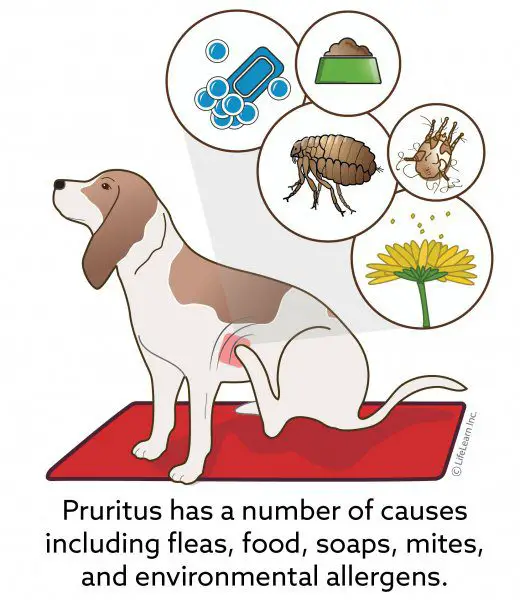Many dog owners notice their dogs scratching or dog licking themselves all the time. If you are one of those owners, you should know that this issue is typical for many pets.
Scratching and licking are often connected to a condition named pruritis or just itching. Besides, many skin conditions result in itchiness.
If you see your dog constantly scratching, it is better to visit a vet immediately so that you can find out the underlying reason. Moreover, knowing the root of the problem, a vet will prescribe the most effective solution for it.
The most crucial thing in such cases is not to treat your pet alone (if you have more than one pet). Keep in mind that a dog can suffer from either extreme or minimal itchiness; the extreme one can even lead to an injury.

Why is my dog so itchy?
First and foremost, itchiness itself is not an illness, and it does not cause disease. Pruritus is more of a symptom that signs a progressing condition.
Watching a scratching dog, the first thing that pops into your mind will be fleas. Even though it is a widespread guess, insects are not the primary cause of scratches and itches.
However, it is important that your four-legged friend should always go through the preventative procedures for ticks and fleas.
The most common reason for your dog being itchy include external parasites, infections, allergies, skin disease, skin cancer, or you wrong care. Keep in mind – when you try to wear a nice dog sweater for your pet, remember about materials.
Here is an example of the right dog sweaters for your dog and wrong dog sweaters. Skin cancer, however, is not a widespread reason. Frequently, itchiness appears only when a dog has yeast infections already.
Despite the degree of pruritus, you need to define the root of the problem and eliminate it.
What about dog allergies?
Allergens can be found anywhere around the dogs. Specifically, exposure to an incitant of allergy occur in several ways:
- Inhalation
- Ingestion
- Topical exposure
When a dog demonstrates such allergic signs as itching, it is because his immune system is continuously facing one or other allergy-causing agents. An allergy starts to progress slowly, remaining exposed to dangerous allergens all the time.
Remember about right dog clothes like dog hoodie and dog sweaters for small dogs
The task of a vet is to define the dangerous incitant of allergy and prescribe a medication to eliminate allergic reactions. There are allergy tests available at the veterinary. Thus, you can try to interpret these by yourself.
However, we recommend asking your vet to carry out the checks and create a treatment plan.

Why does my dog keep scratching-Diagnostics
Before going to a vet, be ready to provide him or her with a detailed and chronological medical history of your four-legged friend. Medical history is precious for defining the real problem that causes allergy reactions in your dog.
Use these tips to make a proper medical history:
- When did you mention the first signs of itchiness? What did your dog do?
- Describe the progress of the condition.
- Have other family members or pets been affected as well?
As you decide to go to a vet (find the best dog backpack for transportation your dog), make a physical examination of the skin. You should find out whether your pet has parasites or any infections.
Both infectious conditions and parasites are widespread among dogs. The good thing is that the pet owners can treat such situations themselves. Still, there are so many more causes besides the mentioned ones, including dry skin, systemic, or metabolic illnesses.
Even if you think that you detected the reason for itchiness by yourself, it is highly recommended to address a vet. Pruritus is a tricky thing, and there can be several interconnected reasons for your dog to be so itchy.
A profound physical examination by a specialist in addition to blood tests and allergy tests will show the core reason for itchiness.







